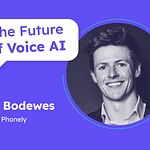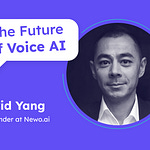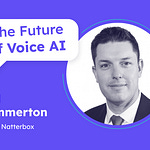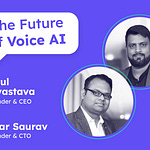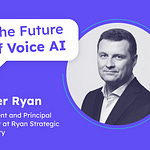In The Future of Voice AI series of interviews, I ask three questions to my guests:
- What problems do you currently see in Enterprise Voice AI?
- How does your company solve these problems?
- What solutions do you envision in the next 5 years?This episode’s guest is Dominic Ligot, Founder, CEO & CTO of CirroLytix.
Dominic Ligot is a data analyst, researcher, software developer, entrepreneur and technologist, as well as an advocate for data literacy, AI ethics, data ethics and social impact from data. His current work focuses on human rights, public health, food security, political risk and fighting disinformation through the use of computational social science, social listening, remote sensing, artificial intelligence and data engineering.
He is the founder and CEO of CirroLytix, a social impact AI company, and Data Ethics PH, an online community focused on social issues such as data privacy, data security, AI-driven discrimination, data liabilities, data ownership rights, and data poverty.
A three-time global winner of the NASA and ESA International Space Apps Challenges, Dominic is passionate about using big data and AI to make a positive difference in the world and creating a better future for society as it transitions through the Fourth Industrial Revolution.
Recap Video
Takeaways
AI's impact on the workforce is misunderstood; it’s more about augmentation than replacement.
The global call center industry, especially in countries like the Philippines and India, is experiencing a shift to AI tools for productivity.
Tools like agent assist make tasks faster but don’t fully automate jobs.
Voice AI tech like accent localization and translation are already transforming the global CX landscape.
AI skepticism and hype coexist and its future lies in balancing both with realistic goals.
Legacy systems in older companies are an expensive obstacle to AI adoption.
Training a workforce to use GenAI effectively is a major challenge.
Prompt engineering is emerging as a critical new skill, emphasizing the need for clear communication with AI systems.
The perception that AI will only displace low-level jobs is off; higher-level cognitive and creative tasks are also being automated.
AI expands the viable labor pool globally, allowing more non-native English speakers to join the workforce.
GenAI could will empower human agents to be "super agents" managing multiple AI tools and tasks.
The AI hype is split between accelerationists, who see it as a game-changer, and doomers, who fear its risks like job loss and over-reliance.
A reckoning in the AI industry is on the brink, as expectations around AGI (Artificial General Intelligence) are tempered.
Countries that invest in creating an AI-enabled workforce, not just traditional tech jobs, will see massive productivity gains.
Fears of AI replacing all jobs overlook its layered, nuanced role in industries.
Future workforces will combine human supervision with AI tools, especially in industries like BPOs.
Building AI skills in 1% of a population could dramatically improve productivity.






